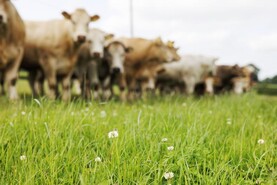A former adviser to DAERA on bovine TB policy has launched stinging criticism at how the department has handled its eradication programme.
Crossgar dairy farmer David Rea, who is also a qualified vet, said there were parallels to the Post Office scandal where post masters were wrongly prosecuted for stealing and false accounting.
“You have small, independent, rural businesses trapped in a cycle of operational, financial and mental difficulty.
“They have been let down by a failing system which is being administered by a powerful and effectively unaccountable organisation.
“Whilst farmers are not being prosecuted, they certainly feel persecuted,” he said.
Speaking at Greenmount on Tuesday, Rea said the current situation with TB in NI was “a public disgrace” which was due to “both political and professional failure”.
Rea, who sat on the former TB Eradication Partnership from 2018 to 2023, said there is “an institutional reluctance” within DAERA to recognise the need for wildlife intervention.
“As recently as spring 2023, longstanding and influential staff were apparently unaware of research demonstrating spillback from wildlife as a cause of TB recurrence. Instead, they insisted that all TB recurrence was driven by testing failure or purchasing,” he said.
Rea said he found it “professionally inexplicable” that DAERA “considered and robustly defended” a TB policy which ignored the disease reservoir in wildlife.
“It was at this point that I personally lost all professional confidence in the modelling aspect of DAERA,” he said.
Key step
While acknowledging that wildlife intervention alone will not eradicate TB, Rea said that of all the measures available, a badger cull will “have the greatest impact” and will be “a key step in the journey towards control”.
He pointed out that extensive scientific research, learnings from other countries including the Republic of Ireland, and the findings of two recent independent reviews in NI all point to the need for wildlife intervention.
However, Rea did not appear hopeful that DAERA will address the issue and roll out a badger cull to the extent that is needed due to pressure from wildlife campaigners.
“During COVID, if our health minister had been a vaccine sceptic, would we feel that it was appropriate for the views of the chief medical officer and his staff to be moulded or influenced by the politics of a minister and a vocal section of society?” he said.
TB on Rea farm estimated to have cost £1m
David Rea has a long-running problem with bovine TB on his dairy farm in Co Down with 250 reactors lost since November 2019.
He estimates that between testing, compensation and DAERA operational costs, this single TB breakdown has cost taxpayers £500,000.
On top of that, the cost to his business runs to at least £450,000, due to the likes of extra labour costs, higher replacement rates, loss of genetic progress with milk quality, and lost profit from milk sales.
Rea has also calculated the environmental cost of bovine TB, which mainly stems from farms carrying extra replacements, keeping beef cattle, and delaying culling of older cows.
His figures are based on a survey of farmers by a local dairy processor where 36% of respondents had been restricted by TB and each of these farms was carrying an additional 42 animals on average.
He estimates that if applied across all NI dairy processors, this equates to an extra 100m gallons of slurry. It requires an extra 17,700 acres of land for spreading and equates to 8% of the surplus phosphorus that is currently in the entire NI agriculture industry.
Rea points out that TB also leads to additional ammonia emissions and he calculates that greenhouse gas emissions on his own farm are 29% higher than they should be due to TB.
Aside from all that, Rea argues that one of the biggest impacts of TB which cannot be accounted for is the chronic stress that it puts on farming families.
“At any time, your income can go down by anything from 10% to 100%, your workload could drop by 50% or it could double, you can lose all the progress that you have made in your career, the situation can last for an indefinite period of time, there is no legal avenue to combat it, and there is a risk that it can happen over and over again,” he said.






 This is a subscriber-only article
This is a subscriber-only article











SHARING OPTIONS: